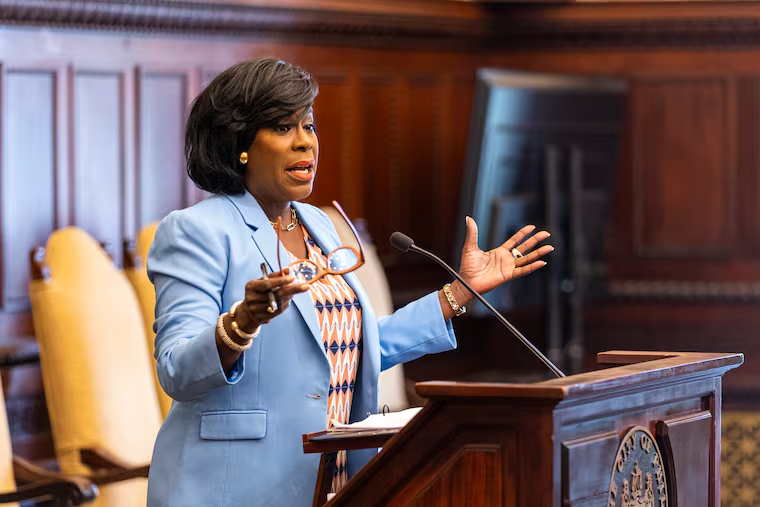Mayor Cherelle Parker wanted Penn’s encampment to end peacefully. Here’s why Philly cops helped dismantle it.
There are several reasons Parker may have wanted to avoid images of Philly cops hauling away college kids appearing on the news, including a separate clearing of a Kensington encampment on Wednesday.

Mayor Cherelle L. Parker spent much of the last week trying to avoid a forceful end to the pro-Palestinian protest encampment at the University of Pennsylvania.
But in the end, it was up to her to decide whether to fulfill Penn’s request for Philadelphia cops to help disband it.
This account of the decision to clear the encampment early Friday morning is based on public statements and information from people with knowledge of the talks who spoke on the condition of anonymity because they did not have permission to discuss private negotiations.
Penn officials first reached out to the city for “general assistance” on May 1, six days after the encampment began, Parker said in a statement. Penn has its own police force, but would need city assistance and cooperation if it was going to clear the encampment.
Parker said she told the school that “Philadelphia Police would provide backup assistance if arrests were made, or if the situation became dangerous or violent.”
But she didn’t want it to come to that. “We were also clear that we expected Penn to explore every option to resolve this matter peacefully,” she said.
Parker directed City Solicitor Renee Garcia and Public Safety Director Adam Geer to try to help with negotiations with the protesters.
Penn Interim President J. Larry Jameson said Monday that the encampment “should end” but that “local public officials ... recommend that we continue to focus on de-escalation and dialogue before taking steps that could inflame tensions.”
There are several reasons Parker may have wanted to avoid images of Philly cops hauling away college kids appearing on the evening news. At the time Penn first reached out, New York police officers’ intense clashes with protesters at Columbia University were making international headlines. Meanwhile, Parker’s administration was planning a separate clearing of an encampment of people experiencing homelessness in Kensington that had the potential to be explosive. That clearing took place Wednesday.
As talks with protesters dragged on, Parker largely avoided commenting on the issue, referring media inquiries to the Police Department. The administration worked together with District Attorney Larry Krasner during the negotiations, a rare moment of alignment for the progressive prosecutor and the tough-on-crime mayor.
But the talks didn’t produce results. And a major turning point came Wednesday night, when protesters held a large rally and expanded the encampment to a second nearby green space.
City and university officials talked that night about clearing the encampment by force, and by Thursday morning Penn had asked the city to provide assistance in accordance with a memorandum of understanding between the Penn and Philadelphia police departments that calls for city cops to help the university when required.
“The University made the decision to clear the encampment,” Parker said. “As such, Penn called, asked for assistance, and Philadelphia Police fulfilled its commitment to provide support.”
Around noon, Gov. Josh Shapiro said it was “past time for the university to act to address this, to disband the encampment and to restore order and safety on campus.” Shapiro, a staunch supporter of Israel, was notably reluctant to call for an end to the encampment up until that point. After Friday morning’s clearing, many thought his comments Thursday propelled the university and city to act.
But a source with knowledge of Shapiro’s involvement said the governor was already aware of the plan for police to disband the encampment when he made the comments.
Later that night, Parker called City Councilmember Jamie Gauthier, whose 3rd District includes Penn’s campus, to give her a heads up about the plan. But Gauthier, a progressive who has expressed sympathy for the protesters, said she was still surprised at the scale of the operation and that it appeared to be “more than a hundred police in riot gear approaching students who were likely sleeping.”
”I just don’t think that the situation, which has been peaceful, demanded that level of aggression,” she said. “And so I was quite taken aback by that.”
By Friday afternoon, the encampment was gone, and Penn’s College Green was quiet.
Staff writers Gillian McGoldrick, Susan Snyder and Anna Orso contributed material.